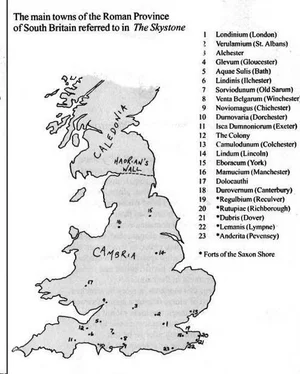I asked him what he saw as the solution to the problem, and he assured me that paganism could not hold out against the slow, patient instruction and enlightenment offered by the Church. Listening to the quiet confidence and conviction in his voice, I had no difficulty in believing him to be right.
I asked him if he had ever had much trouble with the Druids. Weren't they the priests of the old religion? He was amused by my question and told me that he had great hope for the Druids. They were a gentle people, he said, far removed from their bloody and brutal origins. They still existed in the mountainous areas of Britain, but they were followers of Light, easily convertible to the teachings of the gentle Christ. From that point, the conversation drifted naturally to the various customs of the tribes he had encountered earlier in his priesthood on his travels throughout the Empire. He mentioned that he had spent a number of years in Gaul, and I immediately asked him if he had had any dealings with the Bagaudae. From the way he looked me in the eye and smiled, I knew that I had asked the right question of the right man, and for the next quarter of an hour he explained to me why he thought that the communal farm system favoured by these remarkable people — that's what he called them — was destined to become the rural social unit of the future. Of course, as he talked about it, I could see that such a unit would provide the perfect vehicle for the propagation and survival of the Christian faith, but a lot of what he said emphasized and supported what Britannicus had been saying earlier in the afternoon. I was surprisingly disappointed when one of his fellow bishops came over to remind him that they had to leave. As soon as the three Churchmen were off the premises, and after Theodosius, Cicero and the other senior officers had withdrawn to their apartments, the decorum of the evening degenerated quickly. I would have been happy to stay and sample the wares of some of the outrageously beautiful dancing girls who seemed to be preparing to get down to the serious business of the evening, but I left with Britannicus, who, apart from being a senior officer and therefore persona non grata at this stage of the night, was always fastidious to the point of fanaticism concerning women. He came home alone with me, having dismissed his escort, and we sat talking long into the night. It was during this long conversation that I casually produced the skystone dagger in its case.
"What do you think of that?" I handed him the box and, like me, he could not immediately figure out how to open it. I let him work it out for himself and he had it in a few minutes. When he saw what it contained, he made no sound and gave no sign of emotion. He took the knife from its bed and laid the box on a nearby table, and for the next two minutes he said nothing. Then, "Did you make this, Varrus?"
"No. My grandfather again. Do you remember the story of the skystone?" He nodded, not taking his eyes from the dagger. "That was made from the last of the metal from that skystone. He used it as it was. Didn't want to pollute it with ordinary iron as he had the sword he made for my father. It will shave the hair from your arm."
"Varrus, " he whispered, "this is incredibly beautiful. It is enough to make a man believe in magic. I have never seen a blade so pure, so exquisite. Nor a hilt so flawless, though flawless is a word usually reserved for blades. This makes the sword of Theodosius seem tawdry. " He replaced it reverently in its box, shaking his head in awe and leaving the lid off so that he could continue to look at it. "That is a weapon fit for an Emperor. " He looked at me and grinned. "Sad that there has never been an Emperor fit for such a weapon. What makes the blade so silvery?" He held it up so that it reflected the flame of the lamps.
I stared at it, shaking my head. "I don't know, General, but I think there's another metal in there besides iron."
He glanced at me sharply, his interest caught at once. "What kind of metal? What is it?"
I shook my head. "I don't know, General. I have no idea."
He took the knife from its case again, holding it with its point towards me, a puzzled frown on his face. "You must have some kind of an idea! Can't you even make a guess?"
I smiled, more for myself than him. "General, if I had any way of knowing that, I'd be a very rich man."
"Publius, in the name of all the Caesars, there aren't that many metals, are there? You should be able to pinpoint one of them!" I shrugged my shoulders and gave voice to a thought that had lain unspoken in my mind for some time now. "Yes, you'd think so, and I'd have to agree with you if I were convinced that there aren't that many metals. But I'm not convinced. I believe that there could be hundreds of metals that we simply have not yet discovered."
"Hundreds?"
I shrugged. "Well, perhaps not hundreds, but dozens. We know of gold and silver, lead and zinc, copper and tin, and iron. Perhaps a few others."
"What about bronze and brass?"
I was surprised at the naivety of the question. "Those are alloys, Commander, mixtures of the metals I've just named."
"Oh, yes, of course they are. I knew that. Can you name no more?"
"Not offhand, no. Iron is the most recently discovered of these."
"Iron? It's been known for centuries."
"Yes, it has. But we're still only learning how to work with it. It is the hardest of all metals, of course. Or all the ones that we know."
His face was creased in a slight frown. "I'm not sure I know what you are talking about, Publius."
I smiled. "Neither am I, Commander, but I have a half-formed theory on the hardness of metals. The harder they are in themselves, the harder they are to find. Harder to smelt, in the first place."
"Smelt? Like melt?"
"Same thing. Except smelt means to melt out of the raw rock."
"Fascinating! Tell me more about iron, Publius."
"What do you want to know?"
"Everything."
I laughed aloud while the lamp on the table between us flickered, indicating that more oil was needed. It had been full when we sat down. I nodded towards the guttering flame.
"Some other time, I fear, General. It's very late, and I would have a lot to tell you. Didn't you say you are leaving at first light? You'll have no sleep tonight."
"That will be nothing new. I really would like to hear about your theories on the hardness of metal, iron in particular."
"Very well, then, " I said. "On your own head be it. But first I have to replenish the lamp."
I was marshalling my thoughts as I brought oil for the lamp and fresh wine for ourselves, and by the time I sat down again, I knew what I wanted to say. I nodded towards the skystone dagger lying on the table.
"Let's suppose that what I postulate is true. Whatever that stuff is — the metal in that blade — it's not iron. 'Fine, then, ' we say, 'it's something else — but what?'" I squinted at him, then leaned forward to stir the coals in the brazier. "Do you understand what I mean?"
He blinked at me. "No."
"What do we call it, if it isn't iron?"
"I'm sorry, Publius. I don't understand."
"Then I'll show you. Wait here, please. I'll be back in a minute." I came back several minutes later, lugging a heavy wooden box. He watched me, wordlessly, as I spread its contents — three roughly uniform iron bars as long as my forearm and as thick as a finger, and one plain sword blade — on top of the table by his side.
"What do you see?" I asked him, resuming my seat.
"Three iron bars and a sword blade."
"You see any differences between the bars?"
"No, they all look the same."
"Right, now watch this." I picked up the first bar and bent it easily in my hands until it was almost the shape of a horseshoe. I dropped it on the table top, picked up the second bar, and bent it, too, but not as easily, and not as far as the first. Britannicus watched closely, saying nothing. To bend the third bar, I had to place it on the edge of the table and push down, hard, with both arms. The sword blade flexed slightly and would not bend at all.
Читать дальше









